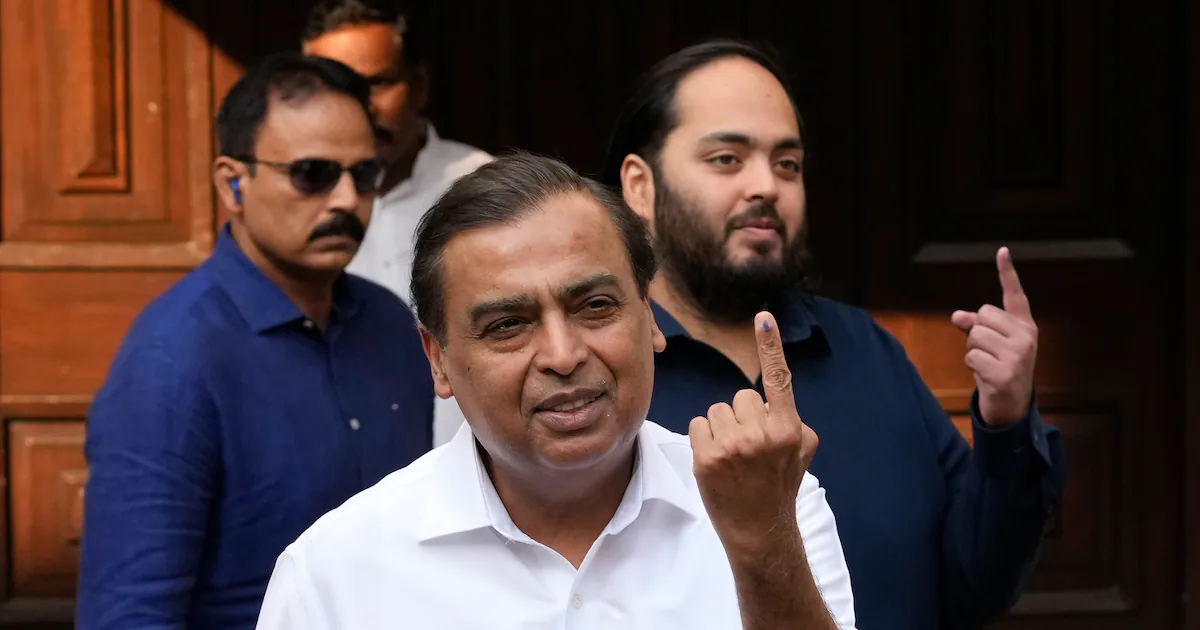
NEW DELHI – When U.S. Treasury Secretary Scott Bessent went on-air last month and said “some of the richest families in India” were profiting off the war in Ukraine, he mentioned no names. But there was little doubt here about who he was alluding to: the billionaire Mukesh Ambani.
He is Asia’s richest man, with an estimated net worth exceeding $100 billion, and his conglomerate, Reliance Industries, touches nearly every part of Indian life. The crown jewel of Ambani’s empire is a division that refines crude oil into fuel products, which feed India’s rising energy demands and are shipped around the world. In recent years, Reliance has bought much of its crude from Russia at discounted prices, a boon for Ambani and a lifeline for Moscow at a time of growing international isolation.
Now, as President Donald Trump punishes India for purchasing Russian oil, and demands that New Delhi diversify its energy supply, the country’s most powerful mogul finds himself at the center of a diplomatic crisis.
Reliance has purchased about $33 billion in oil from Russia since the full-scale invasion of Ukraine in February 2022, a previously unreported sum that accounts for roughly 8 percent of Moscow’s crude sales over that period, according to internal government data obtained by The Washington Post.
“That’s $33 billion that goes to the Kremlin,” said Tom Keatinge, director of the Center for Finance and Security at the Royal United Services Institute, a British think tank. “You are funding war.”
In a statement to The Post, Reliance Industries said its “purchases of Russian oil do not reflect a political position on the conflict,” adding that the purchases “have always been fully compliant with international regulations.”
Since November, at least 17 oil tankers sanctioned by the European Union or Britain for ties to the Russian energy sector have docked at a Reliance-owned port in Sikka, in western Gujarat state, private maritime data and open-source ship information reviewed by The Post showed.
“The UK and E.U. sanctions do not have extraterritorial application, and they explicitly do not apply to non-UK and non-EU entities,” Reliance said in its statement. “For this reason, Reliance can accept such vessels for the delivery of oil.”
In 2021, before the conflict, Reliance bought just $85 million worth of Russian oil, the data showed. The next year, as Russia annexed Ukrainian provinces and bombarded major cities, the figure swelled to $5.5 billion. Reliance purchases peaked in 2023, at $11.7 billion, before dipping to $9.8 billion in 2024. From Jan. 1 to Aug. 12 of this year, the company’s Russian oil buys added up to $6.2 billion, according to The Post’s calculations, which were verified by two independent experts.
The findings offer the most precise picture yet of Reliance’s role in Moscow’s global oil trade, which has helped President Vladimir Putin weather Western sanctions and sustain his onslaught on Ukraine. Last month, Trump said Indian oil purchases “fuel the Russian war machine” and doubled the country’s tariff rate to 50 percent, even as he gave Putin the red-carpet treatment at a summit in Alaska.
India’s government points out that its purchases are not illegal and notes that U.S. officials previously encouraged it to buy Russian crude to stabilize global energy prices. Its external affairs ministry has said Trump’s tariffs are “unfair, unjustified and unreasonable,” and that the country’s purchases of Russian oil were “based on market factors.” As for Ambani – a close ally of Indian Prime Minister Narendra Modi – he has stayed largely silent as U.S.-India relations tumbled to their lowest point in decades.
American negotiators were in New Delhi last week to jump-start stalled trade talks, but Russian oil remains a major impediment. Trump has said he will not approve a trade deal with New Delhi unless it slashes its purchases, The Post reported this month. In recent weeks, Indian negotiators privately told the administration they were willing to cut back on oil from Russia, but couldn’t announce it publicly for fear of domestic political backlash, according to two people familiar with the situation, speaking on the condition of anonymity to discuss sensitive political discussions.
Modi’s office and the Indian Ministry of External Affairs did not respond to requests for comment.
Neither Trump nor his top economic officials, who have taken the lead in lashing out at India, have singled out Reliance for criticism. Yet it is India’s top buyer of Russian oil, according to data from the ship tracking company Kpler, and is likely to remain so for years to come. In December, the company inked a 10-year deal with Rosneft, Russia’s sanctioned state-owned oil company, which provides Reliance with 500,000 barrels of crude oil per day in an agreement valued at $13 billion annually.
Unless Western nations were to broaden their sanctions programs to make such purchases illegal, “there’s no reason to change anything,” said Benjamin Hilgenstock, head of macroeconomic research and strategy at the Kyiv School of Economics’ KSE Institute. “The lucrative business can continue.”
Crude profit
The Reliance empire is sprawling – spanning retail, telecommunications, streaming entertainment and consumer finance. But the unit that manages oil refinement stands above them all, accounting for roughly 58 percent of the company’s $125.3 billion in revenue, according to Reliance.
At the Jamnagar refinery complex, down the road from the port in Sikka, Reliance turns crude oil into diesel and petrol that fuels India and is exported to Europe and other parts of the world. Cheap Russian crude has become an increasingly important part of its operations.
In late 2022, in response to Putin’s war in Ukraine, the Group of Seven and the European Union implemented a price cap of $60 per barrel on Russian crude, allowing the commodity to continue flowing but limiting Moscow’s profits. India was encouraged by Western allies to take advantage of the lower prices and help head off turmoil in the global oil market.
“We’re happy to have India get that bargain,” then-U.S. Treasury Secretary Janet L. Yellen said in November 2022.
Roughly half of Reliance’s crude oil imports through August of this year have come from Russia, according to Kpler. And the margins have turbocharged profits. Since 2022, Reliance has earned an extra $6 billion due to discounted Russian crude, the Financial Times reported recently.
“India’s increased purchase of Russian crude after 2022 … helped stabilize global oil markets and prevent supply shocks,” Reliance said in its statement to The Post. “Allegations of profiteering are baseless and unsubstantiated.”
The 17 tankers sanctioned for ties to Russia have made 29 trips to Sikka port since November, according to the data reviewed by The Post and verified by an independent expert. The tankers flew under flags from nations including the Comoros, Guinea-Bissau and Sierra Leone – “flags of convenience” that are common among aging oil tankers used to circumvent western sanctions on Russian oil, according to two oil sanctions experts. Each, however, carried a unique ship registration code – called an IMO number – that allowed The Post to identify them in OpenSanctions, an international database that consolidates government sanctions lists.
In its statement, Reliance said that “nothing in the delivery of oil to Reliance does or is intended to evade vessel detection, and we reject any contrary inference.”
As an Indian company, Reliance is not legally bound by international sanctions on the ships in question, Hilgenstock said, but allowing them to dock shows it is “not particularly afraid of enforcement action.”
It also highlights the shortcomings of the sanctions regime on Moscow’s energy sector, he said, “because these measures have not limited the ability of actors such as Reliance to buy Russian oil.”
‘Making out like bandits’
As his fortune has soared to new heights, Ambani has tried to make inroads into Trump’s political orbit. He attended the president’s inauguration festivities in January. The two shook hands and exchanged words at a state dinner hosted by Qatar in May. Trump’s daughter, Ivanka, and her husband Jared were guests at Ambani’s lavish wedding for his youngest son last year. Reliance’s real estate unit has paid $10 million to license the Trump name in Mumbai, the Wall Street Journal reported, though details of the project remain unclear.
With tensions between Trump and Modi now centered on Russian oil, Ambani is in awkward spot, analysts said.
Indian companies “got in bed with the Russian refiners immediately after the invasion, and they’re making out like bandits,” Peter Navarro, Trump’s chief economic architect, said on Sept. 15.
Navarro, who has emerged as India’s most forceful critic in Washington, has characterized Russia’s conflict with Ukraine as “Modi’s war” and accused New Delhi of being a “laundromat for the Kremlin.”
In a seeming attempt to cool tensions, Trump called Modi for his 75th birthday last week and thanked the leader for his “support on ending the War between Russia and Ukraine,” according to a post on Truth Social.
Ambani has stayed out of the fray. But in August, during Reliance’s annual meeting, he seemed to gesture at the rising tensions. There is “no substitute for economic strength. This lesson is reinforced by recent geopolitical developments,” he said. “India must gain greater economic strength, and do so with a sense of urgency,” Ambani added, echoing Modi’s recent calls for India to be more self-reliant.
On the prime minister’s birthday, Ambani said in a video post on X that “God almighty himself has sent Modi-ji as an avatar … to lead our motherland to become the greatest nation on earth.”
Kush Amin, a legal specialist at the anti-corruption organization Transparency International, said it’s impossible to decouple Ambani’s business ambitions from the aims of the Indian government. “They are inextricably linked,” Amin said.
Reliance said in its statement to The Post that its “foremost commitment is to be aligned to the government of India’s policy towards promoting India’s energy security through affordable, and reliable energy supplies from multiple sources.”
Russia has exported roughly $410 billion worth of crude oil since the invasion of Ukraine, according to the Centre for Research on Energy and Clean Air (CREA). Though China remains Moscow’s largest customer, India has been the leading buyer of seaborne Russian crude since 2023. Reliance’s $33 billion is “quite a big number” for one company, according to Vaibhav Raghunandan, an analyst at CREA.
“Anyone who is buying Russian oil is feeding into that Kremlin budget, which is then feeding the army,” he said.
Trump’s strategy to reduce India’s dependence on Russian oil may fall flat, experts said. Across-the board tariffs are a “blunt” tool, said Amin, likely to harm both the U.S. and Indian economies. A more targeted approach, involving secondary sanctions on Reliance or its refinery in Jamnagar, could be more effective, sanctions experts said.
“If we want Ambani to stop doing this … we need to put pressure on [Reliance],” Hilgenstock said. “We should not bet on anyone doing the right thing for the right reason.”
– – –



